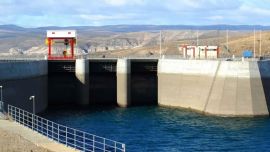Héctor Torres is a former executive director of the International Monetary Fund, a former member of the World Trade Organization’s Task Force on Financial Crisis and trade consultant for the United Nations Environment Programme. He currently serves as a senior fellow at the Centre for International Governance Innovation.
An expert in international trade and economic law and former member of Argentina’s professional diplomatic service, in 2016, he helped the IMF re-establish relations with the Argentine government upon the ascension of the Mauricio Macri administration.
Torres spoke to the Times this week to discuss the country’s post-PASO economic fall-out and the origins of the ongoing crisis.
What is your reaction to President Macri’s announcements this week regarding the minimum wage and tax breaks?
It’s some relief for the people. I would say it’s too little, too late. I believe it’s too late to convince those who didn’t vote for him. In any case it’s relief, giving people some breathing-space.
In your own words, how would you explain the confluence of factors that led to Monday’s crash?
The immediate factor is of course the result of the election that was quite unexpected and gave a large advantage to the Peronist contender. But that’s only the immediate cause – it doesn’t explain it entirely at all.
First of all, the economy was extremely weak already. That cause goes far beyond the election. Having the inheritance that Macri had, he made amazing mistakes that compounded the problem in many ways.
If I had to pinpoint a cause, an outstanding cause of why Argentina is in such difficult economic times, it is because the monetary policy chosen by President Macri did not match at all with the needs of the country and with the political possibilities of the government.
In Argentina, the big problem is always that when the economy grows, the country runs into current account deficit. Then it starts financing that deficit by borrowing. That works for some time. Until you have a reality check for some reason. Sometimes it’s an external shock. Sometimes it’s just that the current account deficit matches with a very big budget deficit. Markets suddenly decide that too much is too much and then we have a crisis.
Why was the monetary policy wrong?
When Macri took office, the Central Bank decided to go into inflation-targeting policy, which is a wonderful policy for economies that are more or less stable. It was not the time to do this at all, and it’s so unbelievable.
For instance, the IMF is in love with inflation targeting. They really like it and they always recommend it. I know from my personal experience because I was at the Fund at that time. In 2016, they strongly recommended against it. They said very clearly: the economy is not ready for inflation targeting. You cannot use interest rates to tame inflation and at the same time raise public service prices. You will appreciate the exchange rate and run into a current account deficit. You will flatten the economy. Don’t do it. We have never seen a case in the world in which a country had any kind of success in taming inflation in three years if you’re starting from 25 or 30 percent.
They said this in writing. In 2016, they carried out the first Article IV consultation for Argentina in 10 years – the previous one was in 2006. We had a very successful conversation with the authorities and the report was fine. Discussions centred precisely about monetary policy and about the lack of preparedness that Argentina had for the monetary policy that the Central Bank had adopted. What the Central Bank did was raise interest rates to a point in which we started having a party of carry trade. We had an inflow of short-term capital inflows. The exchange rate appreciated. We started feeling rich. People started having long trips abroad. Everything was fine. Buenos Aires got to be very expensive.
At the end of 2017 I was in Buenos Aires for a meeting that the country organised for the WTO. I remember that everything was more expensive than Geneva – except for the dollar. It was clearly not sustainable. We ran into a serious current account deficit of about 6.5 percent of GDP, plus a public budget deficit which was over five percent.
I would say that’s the original cause. We cannot use interest rates as the main tool to stop inflation in Argentina, that simply does not work. It doesn’t mean that you don’t have to have a monetary policy that is tight. I’m not arguing that you have to have low-interest rates. The country is a very special country to begin with. The total credit held by banks with respect to GDP is not more than 15 percent, 20 percent on some occasions. In Chile, it must be about 100 percent. In the United States it’s way over 100 percent.
On top of that you have a country in which small and medium enterprises have a very important weight in production and particularly in employment. Small and medium enterprises have a low turn-out. The turn-out of a small enterprise in relation to its fixed costs, is very small. If you raise interest rates, you’re raising fixed costs, and you’re reducing demand and output. The first reaction that the owners have is to raise prices. The second reaction is they raise prices until they can’t do it anymore. When they feel they cannot do it anymore, they stop paying taxes, because outstanding debt with the fiscal authorities is normally much cheaper than borrowing from banks. You’re getting into this snowball problem. It was just such a wrong decision the Central Bank took and [Macri] was responsible, of course.
Why do you think the administration went against the IMF’s recommendation?
It’s just ideology. They’re totally convinced that it works. I believe in the good faith of the wrong decision they took. I have friends who say ‘No, it’s not just they are ideologically biased in favour of this kind of orthodox monetary policies. It’s that they have financial interests.’ I really don’t believe that. I believe that they made the wrong decision.
What do you think was the role the agreement with the IMF had in the recent election?
The agreement with the IMF was an agreement to simply avoid a crisis before the election. It was not an agreement to put the economy back on its feet, far from that. I think it is a political decision that has a lot to do with the support of the United States’ president for Argentina’s president. If it was not for that, of course, the agreement would have been different no doubt. The IMF made, I think, a wrong bet, possibly a bet that was not in the best recommendation of the staff of the IMF.
If Alberto Fernández does nothing between now and October as far as reassuring markets and the economy and leaves it all to Macri, what sort of situation could we expect by the end of the year?
We are on the brink of a default, clearly. The IMF has categorised Argentina’s public debt as “sustainable” but “not with a high probability.” It’s a very weird way of saying something. It’s like saying she’s pregnant but not really.
When they categorise a country in that way, and the country wants to borrow money from the IMF, the country has two possibilities. The first possibility is for the country to find additional financing to that provided by the IMF, that reassures the IMF that the programme will be duly financed. That’s what Argentina and the IMF agreed to, that financing was coming from two additional sources. First, international financial institutions – the IADB, the World Bank, who are providing credit mostly to refinancing payments that we owe. That was and remains one of our one additional source of financing. The other additional source of financing was coming from the private sector. That was the hypothesis.
The IMF accepted that it was very reasonable to expect that during this year the private sector would refinance its claims at maturity. That is not at all a reasonable hypothesis. If I understand correctly, the government is having serious problems in rolling over Leliqs at maturity. Macri, in my view, has to accept that his term is over in December, and call for a transitional government with consensus, having Fernández and [Roberto] Lavagna possibly at the same table. They have to agree on how they will be not only be getting to December 10, but what Fernández will do with the economy after that, giving a clear sign to the markets.
Fernández should also take responsibility in that. Macri and Fernández need to cooperate. The point is that we have a president in denial who blames his contender for everything that happens, and the contender blames the president for everything that happens and he argues that he can do nothing because he has no formal presidential responsibilities. We need a president that accepts, like it or not, the election of last Sunday is determinate, and he will not be re-elected, whatever he does. He has to work for the country, not for his re-election. The country comes first.
For the future of the country, what do you think the implication is that the democratic process could have such a strong effect and backlash on the economic situation, and the entanglement and contradiction between the two?
The implication is that the next president will definitely need to articulate the contradiction between markets and democracy. This is a contradiction you can see not just in Argentina but in many countries in the world. That needs to be articulated.
The previous government, Cristina’s [Fernández de Kirchner] government, thought that politics could overpower the markets. Maybe she believed strongly in that but it’s just ridiculous. Macri seems to come exactly from the opposite side. He believes that he has to be re-elected because the markets like him more. He doesn’t understand why people don’t see that and don’t vote for him again.
On Monday, when I heard him and I saw him, I was saying “He is rejoicing with what’s happening so he can show the people what they can expect if they choose Fernandez.” It was a horrible thing to see. I believe strongly that we need a statesman, that rather than provoking a polarisation between people and markets, will be capable to articulate that contradiction. Of course, markets and democracies don’t only have contradictions. It’s not that one goes one way and one goes the other way, but you cannot pretend that the contradictions do not exist.
The most important discussion in any democratic government is about fiscal policy – it’s about who pays taxes and how you spend them. Once you have democracy, that is the discussion. You need a leader, a statesman, with a strategic view for that. You can wonder if we have it or not, but that’s what we need. It’s nothing I should hide. I have a political preference for Lavagna, whom I believe is the closest to a statesman we have. Argentina needs a Fernando Henrico Cardoso. It needs a Ricardo Lagos. That’s what we need. A man or a woman of that integrity and that political capacity. Whether we have it or not, that’s another story.
The only consolation I have is to see that in the world it is difficult to find these leaders. I don’t know what’s wrong with the world. But I don’t see good leaders anywhere right now. We are in a very special and a very dangerous situation. We are in a polarised world, an increasingly polarised world. This will have serious consequences not just for trade and currencies, but also for peace, and particularly for countries that are middle powers like Argentina.

















Comments